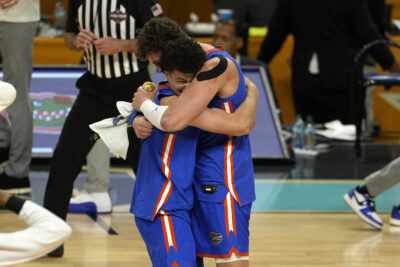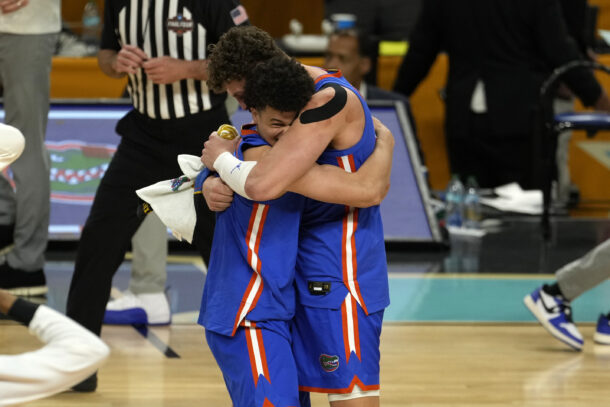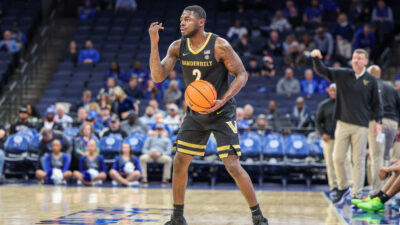
Does Florida have a ‘culture problem?’ Evidence suggests no, but the issue is complicated
In just over 2 weeks, Florida will help kick off the 2019 college football season when they face historic rival Miami in Orlando.
The Week 0 scheduling and primetime television slot should be putting the Gators in the national spotlight as the 2019 season opens, a unique opportunity to showcase the brand of a proud program trying to claw its way back to college football’s upper echelon after spending much of the past decade wandering college football’s wilderness of mediocrity and parochial afterthoughts.
Instead of talking fall camp and a big game against the Canes, however, Dan Mullen spent much of his media press conference this week answering questions about his program’s culture in the aftermath of news leaking that a member of Florida’s program was accused of violence against women for the fifth time in Mullen’s tenure.
This time, the news and questions about gender violence centered on John Huggins, a sophomore from Daytona Beach who was accused of choking a 19-year-old woman who was a Florida football tutor. Huggins has been absent from Florida’s camp, reportedly attending to a “family issue,” and given Florida’s thin depth in some areas of the secondary, his absence was a topic of concern and discussion even before questions about the October 2018 incident surfaced.
Mullen said the 2018 incident has “all been handled.” Within days of the incident, Huggins was suspended 5 games, even after the student tutor declined to press charges with the University Police Department. There also was a University Student Conduct Department board inquiry into Huggins’ violence that resulted in additional (undisclosed due to student privacy laws) punishment, but that too has been meted out, which is why Huggins was able to rejoin the team for the final 3 games of the 2018 season and participate in spring football. In other words, there’s no evidence Huggins’ absence from the program at present is related to the October 2018 incident.
Nevertheless, the news resurfaced this week and is the fifth such incident of Mullen’s tenure, and that generated questions about Florida’s response to incidents of domestic violence and Florida’s football culture more generally.
At this point, it’s important to draw some distinctions, because those are two lines of questioning, and even when interrelated, the existence of one issue does not necessarily portend a problem with the other.
The questions as to how Florida responds to incidents of gender and sexual violence, initially posed by Matt Baker of the Tampa Bay Times, are highly relevant.
The answers, however, are complicated and nuanced, which typically isn’t the type of answer well-received in our hot take, narrative-driven culture.
First things first: Sexual assault and gender violence remain too common. Any allegation of it must be taken seriously. Any instance of it should be an affront to your core values, whether as a person or football program.
According to a study (revised in 2015) by the Department of Justice, more than 4 of 5 victims of gendered and sexual violence are women and the 2nd-highest frequency of those incidents occurs among women aged 18-24. A recent Center for Disease and Prevention study found that annual health care costs associated with sexual and gendered violence are $6 billion annually and in the most severe cases, such as sexual battery and rape (which was alleged as to former Florida QB Jalon Jones), the financial cost is $122,000 per victim. Those figures only frame the pandemic in financial terms; numerous studies demonstrate the psychological and long-term mental health costs to women, regardless of whether criminal charges are prosecuted, are much greater.
So how have Mullen and Florida responded to these incidents and allegations?
It’s important to answer this question before rattling off your preferred narrative or accusing the Gators of “having a culture problem” under Mullen.
The short answer is that of the 5 members of the program accused of sexual or gendered violence, only 1 was formally charged (Justin Watkins, felony domestic, intimate partner violence), yet 4 are no longer part of the program.
Only Huggins remains, even if at present, he is conspicuously absent. The other 4 implicated have been dismissed or politely but firmly asked to leave the program, including 3 players: Jalon Jones (accused of sexual batteries), Brian Edwards (accused of domestic, intimate partner violence) and Watkins; and a recruiting staffer, Otis Yelverton (accused of felony domestic, intimate partner violence).
Accusations against Jalon Jones also contributed to Chris Steele’s transfer. Losing your top recruit is bad, but it wasn’t cultural.
At the time, I wrote — too harshly and without enough balance, in hindsight — that Steele’s departure was largely about refusing to accept the behavior of Jones and his fear of being caught up in it. Some of that was fair. After all, no kid wants to answer questions at their NFL interview as to why their name is in a sexual battery investigation report. But Steele also used the situation with Jones as a pretext to leave because he was homesick. That’s not an indictment of Steele’s character — it’s OK for an 18-year-old kid to be homesick; but I framed the debate wrong because framing the incident as about Steele meant losing sight of how quickly and decisively Mullen and the staff acted toward Jones, who was accused of sexual violence.
In the end, only Huggins remains of the accused, and that’s the case even though after investigation, again, criminal charges were filed against only 1 of the 5 accused individuals.
Granted, it is extremely difficult to prosecute sexual violence, especially intimate partner violence. As someone who has tried these cases to verdict, I can tell you that evidence is often flimsy, with prosecutors left to fight “he said/she said” fights, especially when there is little to no physical evidence. More troubling, women often are afraid to go forward and reluctant to cooperate, whether out of hopelessness that they will have nowhere to go, a lingering affection for their abuser, a desire to salvage a once-promising relationship, or other reasons. This means all too often, abusers aren’t held accountable.
But the fact remains that Mullen removed 4 of the 5 individuals accused from their program even as criminal due process played itself out.
That’s important to consider when we get to question No. 2, which is: “Do the 5 instances of sexual or gendered violence in the Mullen tenure suggest Florida has a ‘culture problem’?”
The evidence suggests Florida doesn’t have a “culture problem.” Mullen and Florida weren’t just responsive to allegations of domestic violence, they were proactive.
They set a high standard by dismissing or forcing out players accused of domestic, sexual and/or gendered violence.
Due process is a fundamental right, but it exists in the vacuum of a criminal courtroom. Just because you get due process in court and aren’t charged with a crime doesn’t mean you have a fundamental right to a college football scholarship.
Florida’s approach — dismissing or asking players to leave even when they aren’t criminally charged — acknowledged this reality, and that seems proactive, especially when compared to other high-profile situations seen across the college sports landscape.
For proof, you can look inward and start with Florida under Urban Meyer, Mullen’s mentor and, by most accounts, still a close friend.
Florida had its share of great human beings in the Meyer era, but the culture Meyer left behind was by Meyer’s admission “broken.” And despite Meyer’s constant moralizing about respecting women and recruiting the “top one percent of the top one percent,” Meyer was hardly a zero-tolerance head coach on the domestic violence front, keeping Chris Rainey on the team after he sent death threats to his girlfriend and playing the role of marriage counselor to the now-disgraced Zach Smith instead of showing him the door when he was arrested for what in photographs appears to have been a ruthless assault of his wife in 2009. As I wrote last year, the truth is that at Florida and Ohio State, Meyer privileged winning over making hard choices about personal accountability and culture.
Mullen’s association with Meyer doubtlessly follows him and is almost certainly part of the increased scrutiny on the Florida program as it relates to these sexual and gendered violence allegations.
But the evidence suggests that Mullen handles it differently than his former boss; preferring program and personal accountability first, even if his decision ultimately conflicts with due process for the individual in the criminal context.
Not all programs agree with Mullen and Florida’s proactive approach.
On the extreme end, Baylor under Art Briles saw 31 players accused of 52 different acts of sexual and gendered violence in his tenure, with only a handful of those players facing program discipline. An investigation by Pepper Hamilton found this approach fostered “the promotion of a rape culture” and numerous Title IX violations, ultimately resulting in Briles’ firing.
At Florida State, a botched rape investigation of star quarterback Jameis Winston resulted in zero punishment for the player, who played through a criminal investigation, ultimately winning the Heisman Trophy and leading the Seminoles to the national championship. Winston was never cleared of the rape, with the Leon County State Attorney’s office simply saying they didn’t have enough evidence to move forward, largely due to police department error. Winston settled with the victim in a civil lawsuit; Jimbo Fisher hid behind due process and, on a particularly bad day, told the national media: “There is no victim” in the case, a particularly brutish example of how the pressure to win can cloud judgment and perspective. When Winston was accused of groping an Uber driver a few years later in the NFL, the fair question of when he would ever learn to be accountable was raised. He certainly didn’t learn it from Fisher.
At Georgia, Kirby Smart has charted a middle ground. He didn’t wait for a criminal conviction to dismiss star wide receiver Jeremiah Holloman this summer, but he did wait for an arrest warrant to be prepared. (The woman later declined to pursue charges.) It was a hard choice from a football standpoint, given the questions facing Georgia at the wide receiver position in 2019. But once the warrant was prepared, Smart acted quickly and decisively. From a moral standpoint, the choice, Smart said, was an easy one.
This isn’t to say there isn’t room for second chances.
Nick Saban has granted them liberally in his tenure at Alabama, with rare instances of it backfiring.
In Mullen’s case, his decision to enroll 5-star defensive linemen Jeffery Simmons at Mississippi State in the spring of 2016 despite the horrific video of Simmons hitting a defenseless woman lying on the ground, forced hard questions of the coach. Mullen argued that after extensive interviews and discussions with Simmons, family members and various community leaders in Simmons’ hometown of Macon, Mississippi, he felt the young man deserved a second chance. Simmons made the most of it, eventually blossoming into an All-American and a first-round draft pick of the Tennessee Titans.
More important, Simmons became a vocal leader in the Starkville community, earning this praise in a tweet from one of his defensive coordinators at Mississippi State:
Jeffery Simmons is the best player I’ve ever coached. More importantly, he is as fine a person as I’ve been around in nearly 30 years as a coach. A Sip Boy, he made a positive impact on his team, school and state. #ULTIMATETEAMMATE https://t.co/mm8kPeiEQq
— Bob Shoop (@CoachBobShoop) February 1, 2019
Simmons praised Mullen specifically for that turnaround, crediting the coach for refusing to write him off over what undoubtedly was his worst moment.
And perhaps it is Simmons’ experience that informs Mullen’s thinking around Huggins.
Mullen recruited Huggins to Florida personally, making him a priority after taking the job in November 2017. It was Mullen’s staff that gave Huggins a Florida offer and Mullen’s staff that signed him to their first recruiting class. Perhaps, given the facts of that specific case and what Mullen learned about Huggins off the field, Mullen decided that particular player warranted a second chance, even if he is struggling with different issues at present.
This is the harder, more nuanced underbelly of coaching. What do you do with a young man who makes a mistake? Do you teach him personal accountability? Do you cast him aside?
A recent study at Eastern Michigan University found that while an impressive and growing number of support services, crisis lines, shelters and legal advocates exists for victims of sexual and gendered violence, there are not many prevention and intervention programs available to men accused of abusive behavior, a troubling trend given identifying and altering male behavior is key to preventing a great deal of sexual and intimate partner violence, which tends to be a crime with a high degree of repeat-offense behavior. Is early intervention a viable strategy? What can a college football coach do? What should they?
These aren’t easy questions, but Mullen appears to be a coach who grapples with them, choosing dismissal in many circumstances and rehabilitation in others.
That’s progress — and at a place like Florida, it’s easy to lose the forest for the trees.
Florida’s football culture was a toxic hellscape before Mullen, a place where Meyer broke the culture and after Will Muschamp’s exceptional cultural reclamation failed to produce enough wins, Jim McElwain set it on fire again. The Credit Card 9 scandal derailed an entire football season before it began, and by the time McElwain resigned late in the 2017 season, the program was so broken off the field it quit on the field against Missouri.
Mullen patched together that culture in 12 short months. But by his own admission, he was and is still searching for leaders in the local room — “alpha dogs,” he calls it — who emphasize accountability on and off the field. Culture-building is a process. Coaches can’t go it alone.
But the evidence suggests Mullen is addressing sexual and gendered violence, and fighting like hell to maintain the culture he repaired and is still building.
Let’s hope, for once, the evidence swamps the convenient narrative.
Neil Blackmon covers SEC football and basketball for SaturdayDownSouth.com. An attorney, he is also a member of the Football and Basketball Writers Associations of America. He also coaches basketball.






